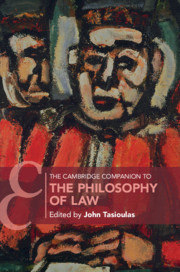Book contents
- The Cambridge Companion to the Philosophy of Law
- Cambridge Companions to Law
- The Cambridge Companion to the Philosophy of Law
- Copyright page
- Dedication
- Contents
- Contributors
- Introduction
- Part I General Theory
- Part II Values
- Part III Special Theory
- 12 Causation and Responsibility
- 13 Punishment
- 14 Constitutional Law
- 15 Civil Rights and Liberties
- 16 Criminal Law
- 17 Contract
- 18 Tort Law and Its Theory
- 19 Property Law
- 20 International Law
- Index
19 - Property Law
from Part III - Special Theory
Published online by Cambridge University Press: 15 June 2020
- The Cambridge Companion to the Philosophy of Law
- Cambridge Companions to Law
- The Cambridge Companion to the Philosophy of Law
- Copyright page
- Dedication
- Contents
- Contributors
- Introduction
- Part I General Theory
- Part II Values
- Part III Special Theory
- 12 Causation and Responsibility
- 13 Punishment
- 14 Constitutional Law
- 15 Civil Rights and Liberties
- 16 Criminal Law
- 17 Contract
- 18 Tort Law and Its Theory
- 19 Property Law
- 20 International Law
- Index
Summary
Is property in some way basic to our moral lives? Many have thought so. For Aristotle, moral virtues, like liberality, presuppose some idea of property, for one can display liberality only with respect to what is one’s own. For Kant, property is a requirement of freedom in the external world. For Locke, property, allocated according to principles of labour and desert, is basic to the very idea of justice that our political institutions are meant to secure. Others have denied that property is foundational in this way, suggesting rather that property is one strategy available to us in meeting the demands of our general theories of justice but is not itself morally basic.1
- Type
- Chapter
- Information
- The Cambridge Companion to the Philosophy of Law , pp. 371 - 388Publisher: Cambridge University PressPrint publication year: 2020

